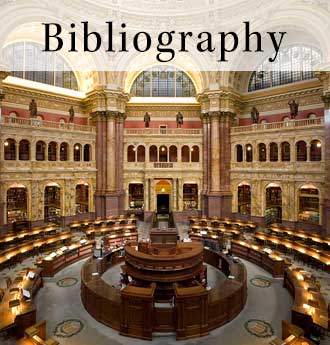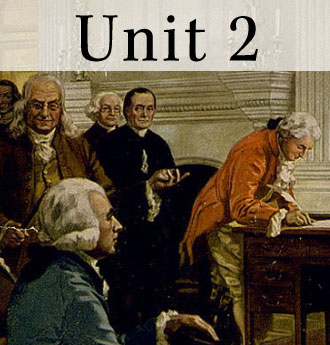Unit 2: How Did the Framers Create the Constitution?
Broadwater, Jeff. George Mason: Forgotten Founder. Chapel Hill: University of North Carolina Press, 2006. 352pp. ISBN: 978-0-80783-053-6. A sympathetic but balanced portrait of an underappreciated Founder.
Conley, Patrick T., and John P. Kaminski, eds. The Bill of Rights and the States: The Colonial and Revolutionary Origins of American Liberties. Madison, WI: Madison House, 1992. 568pp. ISBN: 978-0-94561-229-2. These introductory essays provide a concise overview of the evolution of American individual rights. The state-by-state chapters that follow look to the foundation and development of liberty in each of the first fourteen states.
Kaminski, John P., ed. A Necessary Evil? Slavery and the Debate over the Constitution. Madison, WI: Madison House Publishers, 1995. 301pp. ISBN: 978-0-94561-233-9. A superb collection of primary sources regarding slavery from the Constitutional Convention through the ratification debates in the New England, Middle, and Southern Colonies.
Ketcham, Ralph, ed. The Anti-Federalist Papers and the Constitutional Convention Debates. New York: Mentor, 1986. 416pp. ISBN: 978-0-45152-884-1. This volume includes complete texts of selected Anti-Federalist writings, the Constitutional Convention debates, commentaries, and a very useful index of the ideas discussed and debated during the ratification debates. The introduction helps to put Anti-Federalists and their thoughts in a larger context.
Larson, Edward J., and Michael P. Winship. The Constitutional Convention: A Narrative History from the Notes of James Madison. New York: The Modern Library, 2005. 256pp. ISBN: 978-0-81297-517-8. The authors' goal was to make the deliberations of the Constitutional Convention accessible to modern readers. They have edited out materials deemed extraneous to the main debates while maintaining the integrity of the historical record. The delegates' arguments speak for themselves and will afford the reader insight into the controversies and compromises of the Philadelphia Convention.
Levy, Leonard W., and Dennis J. Mahoney, eds. The Framing and Ratification of the Constitution. New York: Macmillan, 1987. 395pp. ISBN: 978-0-02918-790-6. Short selections on major events and issues of the time written by leading scholars. Writing accessible to diligent students.
Myerson, Michael I. Liberty's Blueprint: How Madison and Hamilton Wrote the Federalist Papers, Defined the Constitution, and Made Democracy Safe for the World. New York: Basic Books, 2008. 336pp. ISBN: 978-0-46500-264-1. Legal scholar Michael Myerson has provided a short, fresh look at how and why the Federalist Papers were written. He examines the collaboration of two very different individuals, Alexander Hamilton and James Madison, and explains why the two friends became political enemies. The Federalist Papers, Myerson contends, remain as relevant today as they were during the founding era. They are a guide to understanding current contentious constitutional issues.
Rakove, Jack N. Original Meanings: Politics and Ideas in the Making of the Constitution. New York: Alfred A. Knopf, 1996. 464pp. ISBN: 978-0-67978-121-9. Pulitzer Prize-winning reexamination of principal issues that the Framers of the Constitution grappled with: federalism, representation, executive power, and rights. In examining the sources of contention, the author reveals the character of the central actors in the Philadelphia Convention.
Rossiter, Clinton, ed. The Federalist Papers. New York: Signet Classics, 2003. 688pp. ISBN: 978-0-45152-881-0. Complete text of the Federalist Papers aided by a brief introduction and very helpful notes. Also contains a copy of the Constitution collated with the papers.
St. John, Jeffrey. Constitutional Journal: A Correspondent's Report from the Convention of 1787. Ottawa, IL: Jameson Books Inc., 1987. 302pp. ISBN: 978-0-91546-355-8. Written as a journalist's eyewitness day-to-day account of the Philadelphia Convention. Praised as "lively, gripping, and informative," it makes the debates at the Convention come alive. The Bicentennial Commission donated a copy to every high school in the United States.
Storing, Herbert J. What the Anti-Federalists Were For: The Political Thought of the Opponents of the Constitution. Chicago: University of Chicago Press, 1981. 120pp. ISBN: 978-0-22677-574-6. Exploration of Anti-Federalist criticisms of the Constitution and their pertinence today. Storing argues that Anti-Federalists are entitled to be counted among the Founders.
Webster, Mary E., ed. The Federalist Papers in Modern Language Indexed for Today's Political Issues. Bellevue, WA: Merrill Press, 1999. 408pp. ISBN: 978-0-93678-321-5. Extended index, glossary, and translation into modern language are aids to reading and understanding the original texts.
Winik, Jay. The Great Upheaval: America and the Birth of the Modern World 1788?1800. New York: HarperCollins, 2007. 688pp. 978-0-06008-313-7. Highly acclaimed and very readable, comparative history of three countries?the United States, France, and Russia?in the throes of revolutionary change. Winik captures the men, women, and tumultuous events of the late eighteenth century and shows how they are interrelated and how they have affected the modern world.
Wood, Gordon S. Revolutionary Characters: What Made the Founders Different. New York: Penguin Press, 2006. 336pp. ISBN: 978-0-14311-208-2. Pulitzer Prize winner. A delight to read, fresh, and insightful. See especially the epilogue, "The Founders and the Creation of Modern Public Opinion." Wood's first Pulitzer book, Radicalism of the American Revolution, is still useful and incomparable.
-
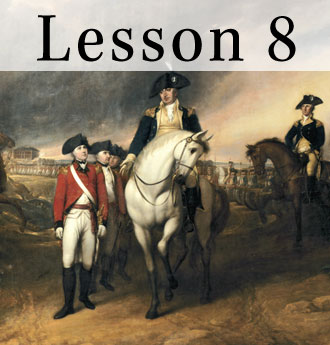 Lesson 8: What Were the Articles of Confederation, and Why Did Some Founders Want to Change Them?
Lesson 8: What Were the Articles of Confederation, and Why Did Some Founders Want to Change Them? -
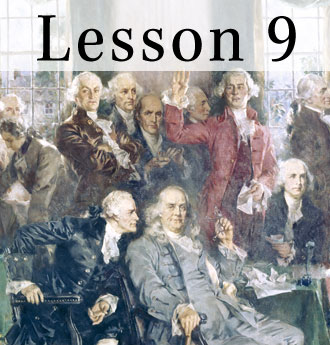 Lesson 9: How Was the Philadelphia Convention Organized?
Lesson 9: How Was the Philadelphia Convention Organized? -
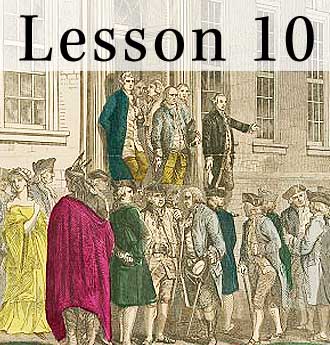 Lesson 10: Why Was Representation a Major Issue at the Philadelphia Convention?
Lesson 10: Why Was Representation a Major Issue at the Philadelphia Convention? -
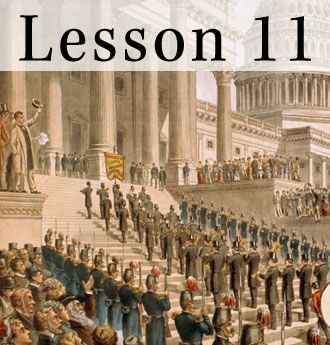 Lesson 11: What Questions Did the Framers Consider in Designing the Three Branches of the National Government?
Lesson 11: What Questions Did the Framers Consider in Designing the Three Branches of the National Government? -
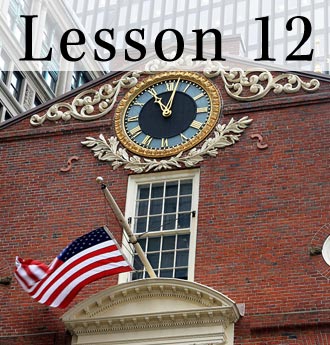 Lesson 12: How Did the Delegates Distribute Powers between National and State Governments?
Lesson 12: How Did the Delegates Distribute Powers between National and State Governments? -
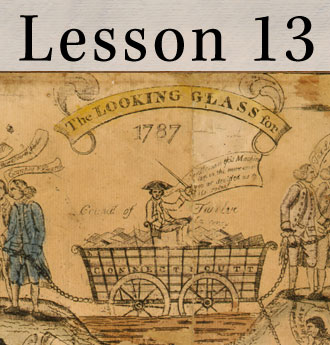 Lesson 13: What Was the Anti-Federalist Position in the Debate about Ratification?
Lesson 13: What Was the Anti-Federalist Position in the Debate about Ratification? -
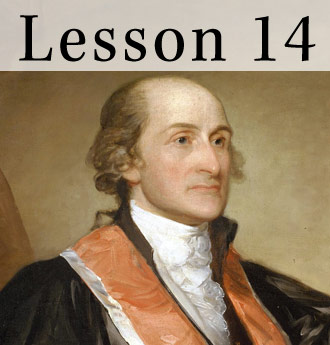 Lesson 14: What Was the Federalist Position in the Debate about Ratification?
Lesson 14: What Was the Federalist Position in the Debate about Ratification? -
